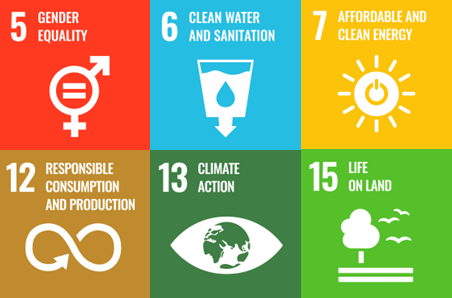Sustainability Strategy

Reykjavík Energy's Sustainability Strategy
The sustainability strategy is the commitment of Reykjavík Energy (RE; Orkuveitan) to show respect for the environment, resources, and society. To that end, elaborate governance practices are in place for continuous improvement. The policy is the basis for successful decisions and good cooperation based on transparency in information provision. RE calls for stakeholders' views on whether the group's activities are sustainable and responds to suggestions responsibly. The sustainability strategy is based on the values of RE – foresight, efficiency and integrity – and is presented in accordance with the guiding vision of the company's ownership strategy.
The sustainability strategy is set out with the following principles and further elaborated through the definition of significant sustainability aspects. The parent company provides professional support and formulates the group's sustainability goals.
Climate and climate risk
RE aims for carbon neutrality of its operations by 2030, and net-zero emissions also for its supply chain by 2040. This way, the carbon footprint of society as a whole is reduced.
At the same time, society’s resilience is enhanced by adapting the utility systems to climate change. Each subsidiary works according to its own climate goals and manages its respective climate-related risks.
Responsible resource management
RE is entrusted with great responsibility for the resources it utilizes. Responsible utilization means that future generations will have corresponding opportunities as current ones, and that it can be confirmed that this is the case. RE is committed to seeking successful solutions where resource utilization in the public interest is weighed and evaluated in the context of other interests, including biological diversity. RE will protect the resources from threats and intrusion, due to the responsibility assigned to the company.
Quality of life
RE is aware that its services are foundations for quality of life in society. Access to its utilities contributes to healthy living conditions for people and creates opportunities for environmentally friendly activities. The group's continuous service, reasonably priced, is therefore imperative.
Reduced emissions and improved utilization
RE operations entail the release of materials and energy into the environment. RE takes utmost precautions in its operations and aims to reduce the emissions related to its processing and operations. Emissions only take place if their impact on health is negligible, and the impact on the environment is acceptable and decreasing. RE reduces its release of pollution as much as possible and focuses on research and development to use the best possible solutions available, keeping the circular economy as a priority.
A good member of society
RE is a large company in terms of Iceland and its workforce encompasses extensive knowledge, experience, and history.
RE shares knowledge and exerts influence in the value chain, where responsible interaction with the environment, responsible consumption behaviour, and positive effects on human rights are encouraged. RE uses its position and knowledge for innovation and development that benefits the group's operations.
Daily operations
As a large and prominent company, it is important that RE is exemplary. RE's operation is based on the good use of resources, discipled work practices, and the high quality of its production and services. RE promotes a culture of respect between its employees, and in their relations with others.
RE complies with all provisions of laws and regulations that apply to its activities.
Significant sustainability aspects
Reykjavík Energy defines the following aspects of sustainability as significant, in light of the principles stated in the sustainability strategy. RE sets goals for these sustainability aspects and defines responsibilities:
Climate and climate risk
- Emissions and emission intensity of greenhouse gases according to scope 1, 2 and 3, and sequestration of greenhouse gases.
- Resilience to climate change
Responsible resource management
- Managing production in high temperature fields
- Managing production in low temperature fields
- Biota, biological diversity, and land use on RE’s property and activity areas
- Conservation of potable water resources
Quality of life
- Security of utility systems
- Price of licensed services
Reduced emissions and improved utilization
- Access to the diverse use of materials and energy flows, including the utilization of sewage waste
- Discharge of geothermal water and monitoring of groundwater
- Discharge of wastewater from sewage treatment plants and of drainage through overflows
A good member of society
- Acquisition and dissemination of knowledge, i.e. for innovation
- Dissemination of knowledge on responsible consumer behaviour
- Grants awarded and received for science and development
- Sustainable procurement
- Energy shift in transport and other areas
- The public's opinion towards RE’s brands
Daily operations
- Waste
- Infrastructure and maintenance
- Use of hazardous substances
- Employee job satisfaction